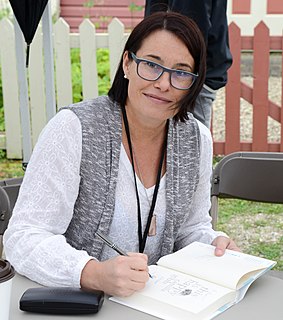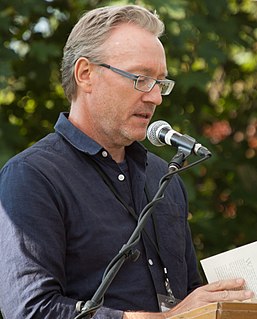A Quote by Salman Rushdie
Laila Lalami has fashioned an absorbing story of one of the first encounters between Spanish conquistadores and Native Americans, a frightening, brutal, and much-falsified history that here, in her brilliantly imagined fiction, is rewritten to give us something that feels very like the truth.
Related Quotes
Once you step inside, history has to be rewritten to include you. A fiction develops a story that weaves you into the social fabric, giving you roots and a local identity. You are assimilated, and in erasing your differences and making you one of their own, the community can maintain belief in its wholeness and purity. After two or three generations, nobody remembers the story is fiction. It has become fact. And this is how history is made.
But Laila has decided that she will not be crippled by resentment. Mariam wouldn’t want it that way. ‘What’s the sense?’ she would say with a smile both innocent and wise. ‘What good is it, Laila jo?’ And so Laila has resigned herself to moving on. For her own sake, for Tariq’s, for her children’s. And for Mariam, who still visits Laila in her dreams, who is never more than a breath or two below her consciousness. Laila has moved on. Because in the end she knows that’s all she can do. That and hope.
I'm not against knowing the history of white people in the U.S. - that's not the point. The point is that there's so much greater history. We don't know about Native Americans. Very basically, we don't know that much about African American history, except that they were enslaved. You only get bits and pieces.
The task that has fallen to us as Americans is to move the conscience of the world, to keep alive the hope and dream of freedom. For if we fail or falter, there'll be no place for the world's oppressed to flee to. This is not a role we sought. We preach no manifest destiny. But like the Americans who brought a new nation into the world 200 years ago, history has asked much of us in our time. Much we've already given; much more we must be prepared to give.
There's no doubt that when it comes to our treatment of Native Americans as well as other persons of color in this country, we've got some very sad and difficult things to account for. I personally would want to see our tragic history, or the tragic elements of our history, acknowledged. I consistently believe that when it comes to whether it's Native Americans or African-American issues or reparations, the most important thing for the U.S. government to do is not just offer words, but offer deeds.
Fiction can produce truth, and truth can be false. What does it mean to say that it's true that, what, two out of six people in this city are starving? That's true, but that is only true because the conditions we live under are completely wrong - that should not be true, and it is. And in something like Sarah Polley's film, her fictions deliver so much truth. The retellings and the simulations and the theatrical aspects are what deliver all the truth.







































